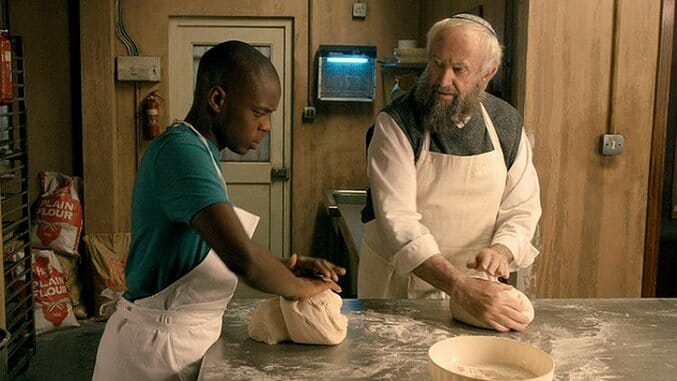Dough

Instead of trying to figure out what kind of movie Dough is, you might be better off figuring out what kind of movie it isn’t. John Goldschmidt has jammed a veritable treasure trove of movie formulae into its 90-minute framework: It is at once a fish-out-of-water picture, a scrappy underdog flick, an “old people say the darndest things!” knee-slapper, a stoner romp, and a culture clash comedy. Goldschmidt even manages to throw in stale jokes about elderly luddites and technology, plus a boxing backstory that is puzzling until it’s convenient for the plot, on top of a drug crime yarn. Talk about value. Dough is the very definition of “bang for your buck,” assuming that hodgepodge is your thing.
The problem dogging Dough is coherence, or maybe it’s more accurate just to say that none of its various modes and ideas wind up cohering. The film is about Nat Dayan (Jonathan Pryce), an aging Jewish baker fallen on hard times. Whether by either the ravages of time or modernity, Nat seems to continuously lose customers at his bakery, a family-owned business that once upon a time was a cornerstone of the neighborhood. Nat’s an old school chap, the kind of guy who rises well before the ass-crack of dawn and starts churning out challah and bagels, reliable as timeworn clockwork. The way Nat spends his mornings stands in contrast to how young Ayyash (Jerome Holder) spends his. As Nat makes muffins, Ayyash tries to elbow his way into the local drug trade, an enterprise that typically ends with him running from the cops.
Ayyash and Nat have one thing immediately in common: They’re both desperate. Nat stands by helplessly as he watches his dwindling livelihood run through his fingers like so much spelt flour. Ayyash, a Muslim and African expat who lives with his mother in council housing where the roof drips water from the upstairs neighbor’s bathtub, is the de facto man of his home. (Dad is M.I.A., though once you learn precisely where in Africa the family came from, you can do the math on his whereabouts without needing to check it.) He and his mom are in desperate need of support and income. If the film used those undercurrents of despair and need as its combined through line, then Goldschmidt might have had something. He would, at least, have maintained a single focal point.
-

-

-

-

-

-

-

-

-

-

-

-

-

-

-

-

-

-

-

-

-

-

-

-

-

-

-

-

-

-

-

-

-

-

-

-

-

-

-

-








































